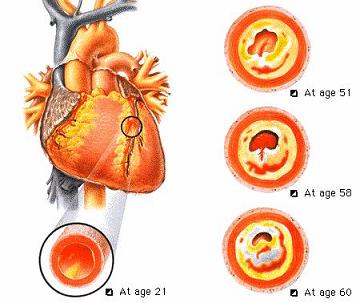Almost all heart attacks occur when a blood clot suddenly and completely blocks a coronary artery. This condition is called a coronary thrombosis, or simply a coronary. The part of the heart muscle nourished by the blocked artery becomes damaged by lack of oxygen. Unless blood flow returns within minutes, muscle damage increases. Heart cells begin to die after four to six hours without blood. The damage can affect the heart's ability to pump and may cause the patient's death. If the clot can be dissolved within four to six hours, damage to the heart can be reduced.
Symptoms. Some people have no warning signs at the beginning of a heart attack. But many people experience angina, dizziness, indigestion, or other symptoms. Most heart attacks cause severe pain. Patients describe the pain as a dull, crushing ache in the chest, but discomfort may extend into the neck, jaw, arms, or back. The pain may last from a few minutes to several hours.
Anyone with chest pain who suspects the pain may be due to a heart attack should seek medical help immediately. Some patients may stop breathing, and their hearts may stop beating. A first-aid technique called cardiopulmonary resuscitation (CPR) can maintain breathing and circulation until a patient can be taken to a hospital. But CPR should be performed only by someone trained in the technique.
|


